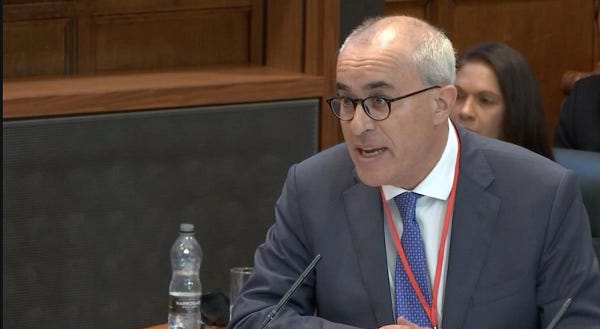Look what the law made me do
Lawyers are not always as innocent as they might wish us to think they are
In my previous offering on these pages, I concluded with an example of two judges seeking to assert – quite unconvincingly, I suggested – that their decision in a case was simply the result of legislation enacted by Parliament. The judgment was, I thought, a rather convoluted legal analysis arriving at a result that few, if any, MPs would have contemplated or intended.
My attention has since turned to another example of a senior lawyer trying to suggest that responsibility for his own reasoning lies with others.
Lord Pannick QC is a barrister of some renown – and not just in legal circles. Famously, he acted for Gina Miller in her two cases against Her Majesty’s Government. In the first of those cases, he argued in front of the Supreme Court that Theresa May’s government needed parliamentary approval before it was entitled to serve notice of withdrawal from the European Union in 2017. In the second, he argued that the prorogation of Parliament in late 2019 was ineffective. He succeeded both times. Impressive.


More recently, Lord Pannick attempted to persuade the House of Lords to exempt barristers from new a rule which requires peers to register their work for foreign governments and also to disclose their earnings from such work. He was less successful on that occasion.
Legal commentator, Joshua Rozenberg, reports that Pannick made some “powerful points” on the way to losing the argument. I have read the crucial argument and, if you stay with me for just a few more paragraphs, so will you. I cannot help but wonder whether Rozenberg’s keyboard has been programmed to auto-insert the word “powerful” whenever it sees “Pannick” and “points” in close proximity. As we shall see, the point was neatly put, but not very powerful at all.
Focussing on the phrase “working for a foreign power”, Lord Pannick spoke as follows:
I have to tell … other members of this House that, when I sit in Blackstone Chambers drafting a legal advice, I am not working for a foreign power. The very description suggests something sinister and improper. I am giving clients legal advice as to their legal rights and obligations, as I do with all other clients. Some noble Lords — and, I am afraid to say, the committee — fundamentally misunderstand the nature of the role of the barrister.
I think the magic of the Pannick advocacy lay in the phrase “giving clients legal advice as to their legal rights and obligations”. Those words invite us to see nothing but an objective explanation. They cry out that a barrister is not aiding or abetting a client. No matter whether the client is a foreign power or an ordinary person, the barrister is merely giving a neutral assessment of the client’s rights and obligations under the law.
Really? One only has to reflect for a moment on the Miller cases (mentioned above) to realise that, in those complex and ground-breaking cases, Pannick did not merely advise his client on the rights and obligations that were known to exist in the prevailing circumstances. He was advising his client on ways in which certain rights might be narrowed and certain obligations might be expanded.
And it was not, of course, his client’s rights and obligations that he was advising on. The issues at the core of Pannick’s advice were the government’s rights and obligations. Having received instructions to proceed, Pannick developed arguments that were designed to persuade the highest court in the land to arrive at a view that favoured his client’s objectives.
So we can see that advising a client “as to their legal rights and obligations” is very far from the beginning and the end of a barrister’s job description.
In the passage quoted above from his speech, Pannick suggested that “some noble Lords … fundamentally misunderstand the nature of the role of the barrister”. I would suggest that any noble Lords who were in that position before Lord Pannick spoke were very probably still in that position afterwards – albeit that the nature of their misunderstanding may have been altered.
I first encountered David Pannick when we were contemporaries at university. I think I spotted back then that he was someone with great talent. There is nothing in anything I have written here which is intended to suggest that his work – in Blackstone Chambers or anywhere else – is ever (to borrow his own words) “sinister or improper”.
The language he used to describe the barrister’s role is an example of the sort of advocacy that a barrister employs in an attempt to win the argument. In this case, it did not succeed.
Lawyers don’t just explain or interpret the law. Those at the top of the profession sometimes find themselves in a position where they are able to make new law or, at the very least, reinterpret the existing law.
If you enjoyed this analysis, please consider clicking on the share button so that others will see it. You can also subscribe, free of charge, to make sure that you never miss any of my future Irregular Thoughts.




Thanks for the mention, Simon.
I think "rights" must include contingent rights — those that have not yet been upheld by a court. Those rights are surely the correlative of someone else's obligations — in this case the government's — as you will remember if you took the jurisprudence paper and had to read Hohfeld.
And I don't accept that lawyers make new law. They may initiate the law-making process. But lawyers are powerless unless they can persuade the courts to find in their favour.
Joshua